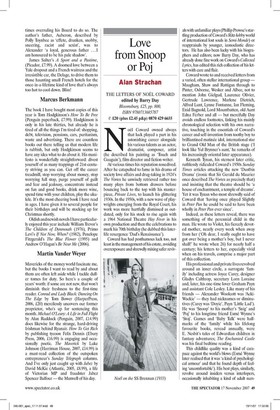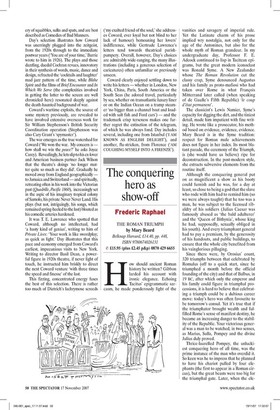Love from Snoop or Poj
Alan Strachan THE LETTERS OF NOEL COWARD edited by Barry Day Bloomsbury, £25, pp. 800, ISBN 9780713685787 £20 (plus £2.45 p&p) 0870 429 6655 Noel Coward owned always that luck played a part in his astonishing career alongside his various talents as an actor, dramatist, composer, artist (he described his painting as 'Touch and Gauguin'), film director and fiction-writer.
At various times his reputation nosedived. After he catapulted to fame in his drama of society love affairs and drug-taking in 1924's The Vortex he unwisely retrieved rather too many plays from bottom drawers before bouncing back to the top with his masterpiece, Private Lives, to launch his glittering 1930s. In the 1950s, with a new wave of playwrights emerging from the Royal Court, his work was more hurtfully dismissed as outdated, only for his stock to rise again with a 1964 National Theatre Hay Fever in his own production and then the celebrations to mark his 70th birthday (he dubbed this laterlife resurgence `Dad's Renaissance').
Coward has had posthumous luck too, not least in the management of his estate, avoiding overexposure and shrewdly mixing safer revivals with unfamiliar plays (Phillip Prowse's startling production of Coward's Ritz-lobby world of international lost souls in Semi-Monde) or reappraisals by younger, iconoclastic directors. He has also been lucky with his biographers and editors; now Barry Day, who has already done fine work on Coward's Collected Lyrics, has edited this rich collection of his letters with care and flair.
Coward wrote to and received letters from a varied, often stellar international group — Maugham, Shaw and Rattigan through to Pinter, Osborne, Wesker and Albee, not to mention John Gielgud, Laurence Olivier, Gertrude Lawrence, Marlene Dietrich, Alfred Lunt, Lynne Fontanne, Ian Fleming, Enid Bagnold, Lord Mountbatten, old Aunt Edna Ferber and all — but mercifully Day avoids endless footnotes, linking his mainly chronological selection with his own narrative, touching in the essentials of Coward's career and self-invention from toothy boy to brilliantined matinee idol, international star to Grand Old Man of the British stage (I look like Yul Brynner's aunt,' he remarks of his increasingly oriental later appearance).
Kenneth Tynan, his sternest later critic, ruthlessly ridiculed Coward's 1950s Sunday Times articles attacking the new 'Dustbin Drama' (ironic that Sir Gerald du Maurier once described The Vortex as precisely that) and insisting that the theatre should be 'a house of enchantment, a temple of dreams'. Yet it was Tynan who most shrewdly said of Coward that 'having once played Slightly in Peter Pan he could be said to have been wholly in Peter Pan ever since'.
Indeed, as these letters reveal, there was something of the perennial child in the man. He wrote to Violet, his fiercely devoted mother, nearly every week when away from her (Oh dear, I really ought to have got over being a mother's boy, but I never shall!' he wrote when 26) for nearly half a century; his letters to her, especially vivid when on his travels, comprise a major part of this collection.
His professional and private lives revolved around an inner circle, a surrogate 'family' including actress Joyce Carey, designer Gladys Calthrop, secretary Lorn Loraine and, later, his one-time lover Graham Payn and assistant Cole Lesley. Like many of his friends — Alexander Woolcott was AckiWackie' — they had nicknames or diminutives (Carey was 'Doyle', Payn 'Little Lad'). He was 'Snoop' to his mother's `Snig' and Toy to his longtime friend Esme Wynne's `Stof . Games and 'Baby Talk' were hallmarks of the 'family' while his lifelong favourite books, reread annually, were E. Nesbit's tales of Edwardian children in fantasy adventures; The Enchanted Castle was his final bedtime reading.
This childlike quality was a kind of carapace against the world's blows (Esme Wynne later realised that it was 'a kind of psychological armour' and that he found depth of feeling `uncomfortable'). His best plays, similarly, revolve around insiders versus interlopers, occasionally inhabiting a kind of adult nursery of squabbles, sulks and spats, and are best described as Comedies of Bad Manners.
Day's selection illustrates how Coward was unerringly plugged into the zeitgeist, from the 1920s through to the immediate postwar years (You are of your time,' Barrie wrote to him in 1926). The plays and those dazzling, daedal Cochran revues, innovatory in their synthesis of words, music, dance and design, refracted the 'cocktails and laughter' mad jazz pattern of the time, while Blithe Spirit and the films of Brief Encounter and In Which We Serve (the complexities involved in getting the latter to the screen are well chronicled here) resonated deeply against the death-haunted background of war.
Coward's wartime exploits, the source of some mystery previously, are revealed to have involved extensive overseas work for Sir William Stephenson's British Security Coordination operation (Stephenson was also Cary Grant's `spymastef ).
The war emerges as the true watershed for Coward ('We won the war. My concern is — how shall we win the peace?' he asks Joyce Carey). Revealingly, he lets slip to his ex-lover and American business partner Jack Wilson that the theatre's doings `no longer matter quite so much as they did'. Gradually he moved away from England geographically — to Jamaica and Switzerland — and spiritually, retreating often in his work into the Victorian past (Quadrille, Pacific 1860), increasingly set in the aspic of his imaginary tropical colony of Samolo, his private Never Never Land. His plays (but not, intriguingly, his songs, which remained spring-heeled to the last) bloated as his comedic arteries hardened.
It was T. E. Lawrence who spotted that Coward, although no intellectual, had 'a hasty kind of genius', writing to him of Private Lives: 'Your work is like swordplay; as quick as light.' Day illustrates that this pace and economy emerged from Coward's earliest, impecunious visits to New York. Writing to director Basil Dean, a powerful figure in 1920s theatre, if never light of touch, he instructed him briskly to direct the next Coward venture 'with three times the speed and finesse' of the last.
This fizzing, concentrated energy fuses the best of this selection. There is rather too much of Dietrich's lachrymose screeds 5 (my exalted friend of the soul,' she addresses Coward, ever loyal but not blind to her lack of humour) bemoaning her lovers' indifference, while Gertrude Lawrence's letters tend towards theatrical parishpumpery. Overall, however, Day's choices are admirably wide-ranging, the many illustrations (including a generous selection of caricatures) often unfamiliar or previously unseen.
Coward clearly enjoyed settling down to write his letters — whether in London, New York, China, Paris, South America or the South Seas (he adored travel, particularly by sea, whether on transatlantic luxury liner or on the Indian Ocean on a tramp steamer `no bigger than a channel boat and loaded with salt fish and Ford cars') — and the trademark crisp terseness makes one further regret the extinction of the telegram, of which he was always fond. Day includes several, including one from Istanbul (I AM KNOWN AS ENGLISH DELIGHT), and another, flu-stricken, from Florence (AM COUGHING MYSELF INTO A FIRENZE').





































































 Previous page
Previous page